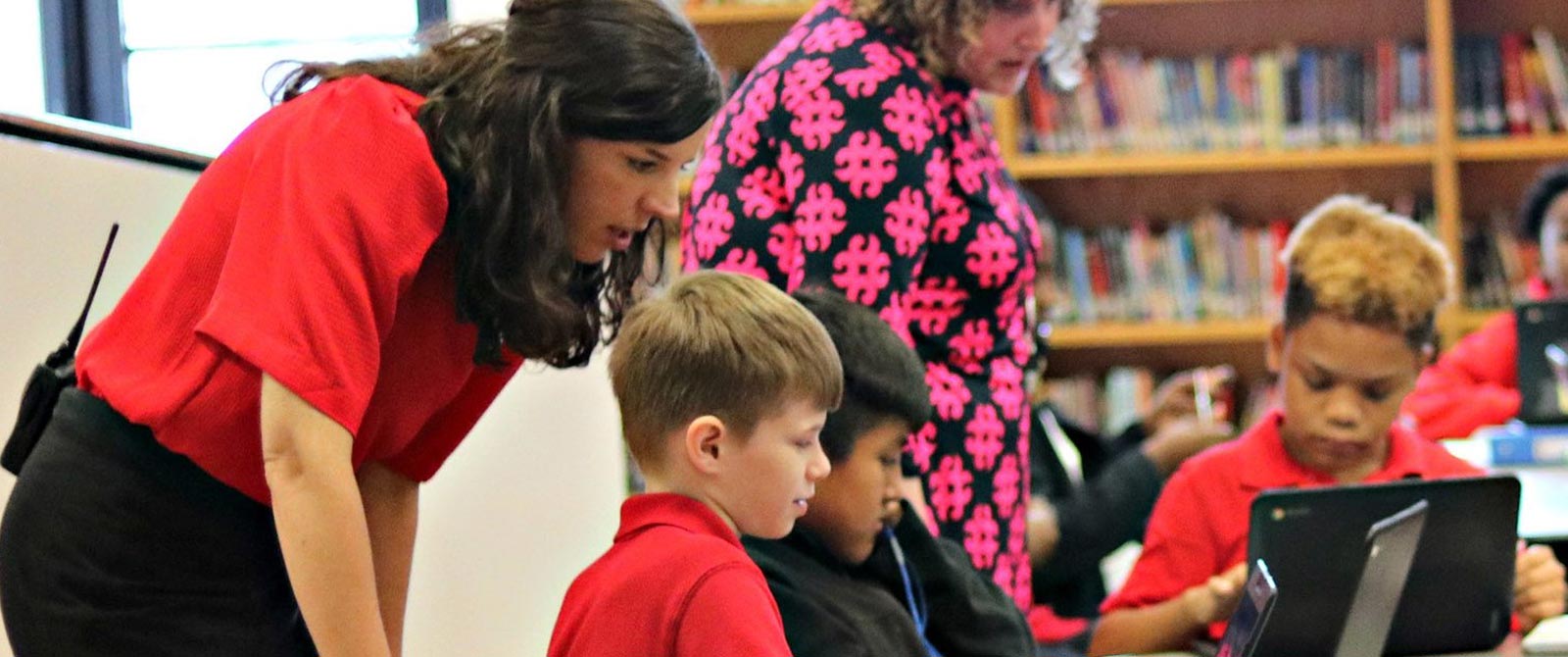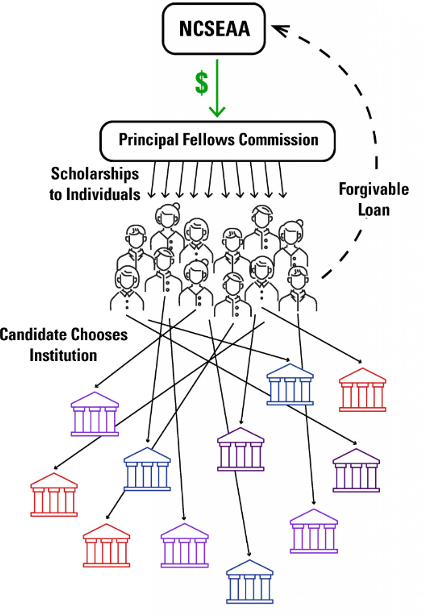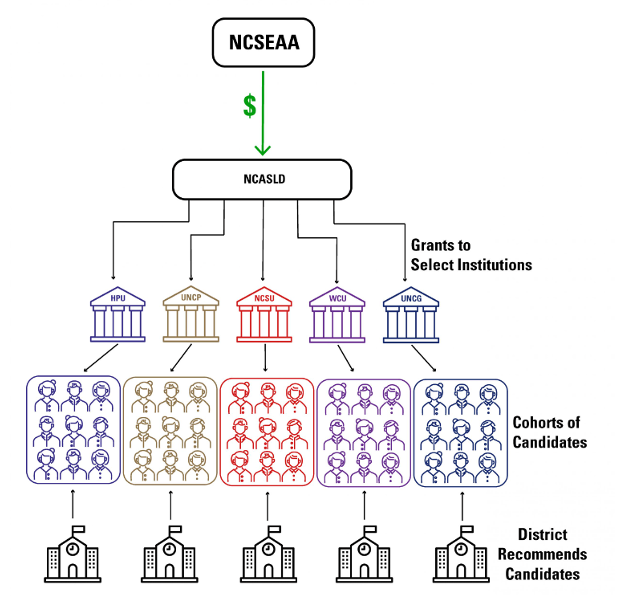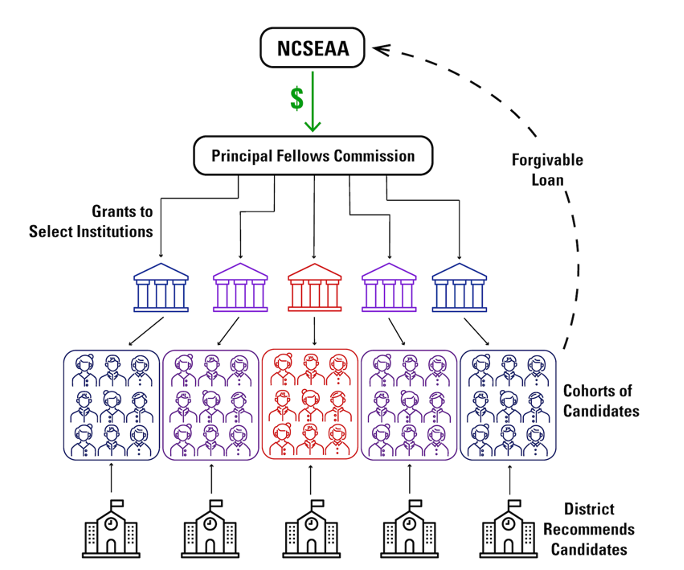
The North Carolina Principal Fellows Program
A Historical Summary
The North Carolina Principal Fellows Program (NCPFP) was established in 1993 by the NC General Assembly and provides a competitive, merit-based scholarship loan to persons of exceptional academic ability who have teaching or relevant experience and desire to enter school administration in a North Carolina public school. The program’s two overarching goals are to prepare a pipeline of effective principals to meet the demands of the North Carolina principal workforce and to equip top tier candidates for school leadership who positively impact student learning outcomes in North Carolina. For more than 25 years this program has provided academic funding (approximately 3.25 million in annual funding) and mentoring to over 1200 school leaders.

Image Source: bestnc.org
Principal Fellows (PFs) complete their Masters in School Administration at any partnering public NC university. Fellows complete one year of academic study and another as a full-time administrative intern at a local school. They also participate in many enrichment activities that help them learn and connect with other school leaders from around the state.
Fellows are required to maintain employment as a principal or assistant principal in a public school in North Carolina for four years to repay the scholarship loan. Financial need is not a criterion for selection as a Principal Fellow.
NCPFP is administered by the North Carolina Principal Fellows Commission in collaboration with the North Carolina State Education Assistance Authority (NCSEAA); both agencies are affiliated with the University of North Carolina System Office, General Administration (UNC-GA). Selection criteria, the selection process, selection outreach efforts, renewal and continuation criteria and liaison with the educational community are the responsibilities of the Principal Fellows Commission. The Commission is staffed and chaired by the Director of the Principal Fellows Program. Rules to administer the NCPFP are the responsibility of the Board of Directors of SEAA.
Each university has a campus coordinator who provides leadership to each cohort of Principal Fellows on their campus. Campus coordinators provide mentoring, and coordinate a variety of experiences for the Fellows including enrichment activities such as seminars and workshops and site visits to school districts, businesses and educational organizations, and supervise the internship which occurs in the second year. The coordinator works closely with Fellows to ensure they have a successful experience in the program.
There are many benefits of the Principal Fellows Program -- to the Fellow and public schools of NC. These include the financial support provided while earning an MSA, the opportunity for school districts to work with Principal Fellow interns for a year, and the development of a pool of well-trained, highly qualified administrative candidates available to all North Carolina school systems. Professional development activities with a focus on leadership development are offered by individual universities and at the state level through the NCPFP office.
The Transforming Principal Preparation Program
A Novel Approach to Principal Preparation Funding
Source: Policy Brief on TP3 from BEST NC
In 2015, BEST NC, a non-profit, non-partisan coalition of business leaders committed to improving North Carolina’s education system through policy and advocacy, worked with the NC House and Senate to create and provide funding for a new and innovative approach to principal preparation. Known as Transforming Principal Preparation, this novel program was incorporated into the NC state budget with an initial investment of one million dollars.
The Transforming Principal Preparation Program (TP3) policy makes state funds available to principal preparation programs through a competitive grant process. Traditional public and independent institutions of higher education are eligible to apply, as are non-traditional, non-profit routes of entry. Through the incentive of state funds, TP3 integrates the key research-based components of successful principal preparation nationwide, including:
- Proactive, intentional recruitment efforts;
- A high bar for entry;
- Rigorous and relevant coursework;
- A full-time, paid residency; and
- A focus on authentic partnerships with and preparation for service in high-need schools and districts.
An overarching focus of this approach, in addition to recognizing and rewarding the state’s most outstanding preparation programs, is to empower institutions to flip the traditional “customer” relationship from one focused on principal candidates’ available time and ability to pay, to one dedicated to students’ and schools’ needs. By investing state funds to subsidize candidates’ tuition and residency, North Carolina is enabling institutions to be highly selective with new candidates and provide them with the deep, practice-based preparation research suggests they need. No longer forced to chase tuition dollars, North Carolina’s TP3 programs are able to make K-12 students, schools, and districts their primary customers.
The North Carolina Alliance for School Leadership Development (NCASLD), a non-profit organization based in North Carolina and allied with the state principals’ association, was selected by the state’s Education Assistance Authority (a quasi-governmental agency associated with the UNC System) to oversee the program. NCASLD was chosen through a competitive process to make grant awards and oversee renewals on a five year-basis. NCASLD issued its first RFP in the spring of 2016, and awarded a grant from the initial $1M in state funds to North Carolina State University (which operates the Northeast Leadership Academy) to expand its cohort into Durham, a high-need urban district in the Research Triangle region.
During the 2016 Legislative session, North Carolina significantly expanded funding for TP3, bringing the total recurring state investment to $4.5M. At the conclusion of the session, the NCASLD issued a second RFP and selected an additional five institutions to prepare principal candidates in the western, piedmont, and coastal regions of the state. Each program selected new principal candidates in late fall of 2016, and began serving participants in January 2017. In 2017-18, the six programs are serving approximately 120 principal candidates with $4.2M in state funds each year ($300K is set aside each year for program administration and evaluation). The six programs represent partnerships with 46 districts (40 percent) across the state.
Each of the initial TP3 programs is operated by a traditional institution of higher education (three public universities and one private) with the exception of Sandhills Leadership Academy, which partnered with the University of North Carolina at Pembroke and a local school district as its fiscal agent. The TP3 grantees were selected through a competitive process based on their proposed program alignment with the research-based components of highly-successful principal preparation programs, and specific priorities of the North Carolina General Assembly.
Selection Criteria:
- An aggressive and intentional recruitment strategy;
- Rigorous selection criteria based on competencies that are predictive of success as a school leader;
- Rigorous coursework that effectively links theory with practice;
- Full-time paid clinical practice of at least five months and 750 hours in duration;
- Multiple opportunities for school leader candidates to be observed and coached by program faculty;
- A process for continuous program improvement based on feedback from partnering districts and data from program completers, including student achievement data; and
- Dynamic partnerships with districts that are used to inform and improve the program.
In addition, grantees were required to show prior success in preparing principals for high-need school environments, or to propose a research-based design. Priority was given to programs that demonstrated a commitment and capacity to prepare leaders for high-need, low-performing schools.
In just the first year of implementation, challenges have arisen with TP3 that required active collaboration, communication, and policy advocacy to address. First, governance of the program was complicated, with grant-approved programs reporting to the NCASLD, an independent non-profit organization with deep expertise in the principalship but no connection to the state nor established infrastructure for distributing state funds. The NCASLD further reported to the North Carolina State Education Assistance Authority (NCSEAA), a quasi-governmental state agency with ties to the University of North Carolina system. NCSEAA has final authority over all grant awards and renewals, but no content expertise in the preparation of public school principals. Talented and committed leaders were able to make this arrangement work, but all stakeholders needed to assess the governance structure to ensure the success of the TP3 program and its stability for the future.

Image Source: bestnc.org
The NC Principal Fellows Program
July 1, 2021 and beyond
A Blended Model Preserving the History and Future of Principal Preparation
Source: bestnc.org
In 2019, the TP3 program was consolidated with the North Carolina Principal Fellows Program, creating a single, unified, principal preparation program for our state. The new TP3/Principal Fellows program combines TP3’s competitive grants-based model with the Principal Fellows’ Commission-based governance to ensure North Carolina’s top talent is recruited and rigorously prepared for leadership in our state’s highest need schools.
By pooling the funding from each of the individual programs, the consolidated TP3/Principal Fellows program is now able to utilize its resources more efficiently to recruit high-quality candidates to the most rigorous, evidence-based preparation programs. Together, the merged program will produce as much as 40%+ of the annual principal pipeline for the state.

Image Source: bestnc.org
Learn more about the merger and the new NC Principal Fellows Program by clicking the buttons below.